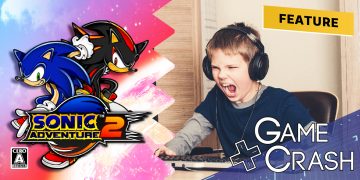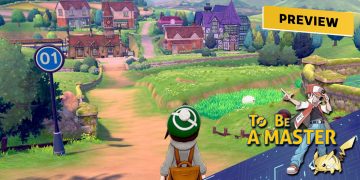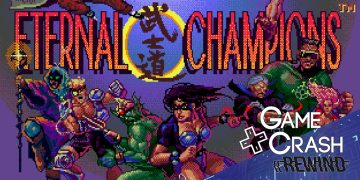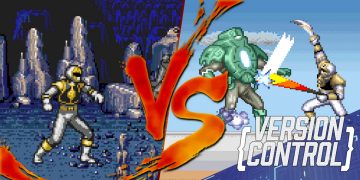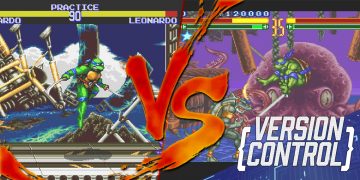This year’s God of War joins such dubious company as Sonic The Hedgehog (2006); Bomberman (2014); Thief (2014); and Sim City (2013) by needing to add a year in brackets to the end of the name so that it’s clear which game we’re talking about. All thanks to its decision to eschew any subtitle.
The good news is that, unlike those games, it’s actually really good. Even better still is that it earns the value of being a new beginning, a fresh start for the series, that such a naming decision implies.
Kratos’ rampage through ancient Greece was a hedonistic revel that seems – especially in hindsight, having completed this latest instalment – very of its time now. It’s even thematically appropriate that this game sees Kratos taking on the mantle of being a parent by viewing it through the lens of having grown out of stuff like mini-game orgies. In almost every sense, this God of War is an actual ‘mature’ game. It earns that label by tackling complex subjects and emotions as well as brutal combat and not by resorting to using sex as titillation, or worse, a reward. As the audience for gaming has grown up, so too have their games.
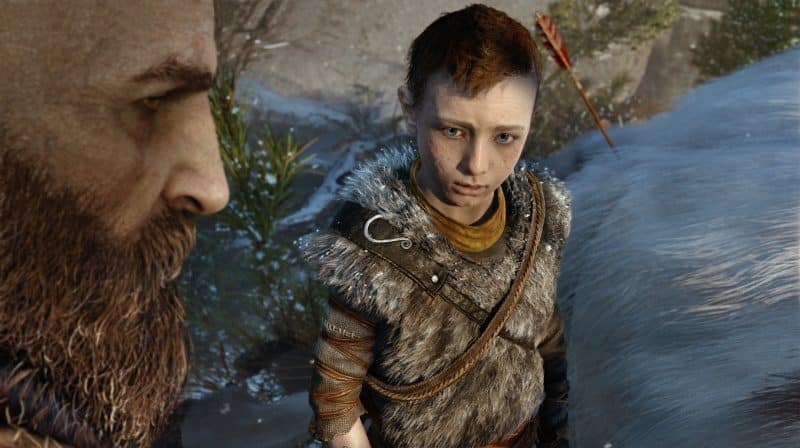
God of War succeeds with these themes in a way that few – if any – games before it manages. By making it a genuine and even realistic experience through the eyes of a father. Even one as stoic and aloof as Kratos. Not to mention so fantastic and powerful that he spends much of his time in these games punching actual Gods to death.
The game’s story picks up shortly after the death of Kratos’ wife and mother of his child, Atreus. Throughout Kratos’ journey with his son, he must learn to connect with the boy in a way he obviously hasn’t before.
In between violent fights with demons, wolves and Gods, Kratos also has to handle merely being a father. Dealing with his child’s illnesses and guiding him through a pretty special kind of puberty (Atreus is not only becoming a man but a God). Overall, preparing Atreus for life beyond his childhood.
Succeeding at carrying such a rich narrative theme throughout, while still finding time to be a fantastic action game is a testament to Cory Barlog’s team at Sony Santa Monica. Narratively, this genuinely emotional storytelling and game direction is often exclusively the purview of low-budget indie games like That Dragon Cancer. God of War demonstrates that it’s far from impossible to tell this kind of story within the trappings of a AAA game.
There’s open-world, clear the map, style gameplay; RPG-style stats; skills and weapon upgrades; and a robust action combat system. All of it still works towards the goal of telling the game’s simple story of a father and son attempting to honour the wishes of a dead mother. And it all works very, very well.
Part of the reason you will feel so engaged with this game’s story is, undoubtedly, the masterstroke of game design that is the game’s camera. That may sound like a bizarre banner to fly for any game, but trust me, it makes more difference than you’d possibly imagine without seeing it for yourself.
Throughout the game – from the game’s launch menu to the very, very end when Kratos finally rests at the end of his adventure – the camera never cuts away from the action. If the game were a movie, it would all be filmed as one single shot in, effectively, one single scene.
The mechanics of doing so are enormously more straightforward in a game than in a film, but it achieves a similar effect all the same. You aren’t jumped around from setting to setting, or level to level – you start the journey and directly follow it to its very conclusion. Even if that does mean standing still in a lift for a minute while the game loads the next part of the level around you…
Taking the camera from being in a fixed position, meandering in the skies above Kratos through his Grecian adventures, to putting it right over his shoulder in this game also does wonders for genuinely bringing you into the physicality of the action.
The game’s first fight with one of the Norse Pantheon feels like a truly brutal brawl. The screen shakes with each punch and Kratos is sent bouldering around like a doll being toyed with by a rabid dog.
The camera even enhances the game’s encounters and set pieces such as the Midgard Serpent. A snake large enough to wrap around the entire world. The scale at play is just staggering when viewed from Kratos’ perspective, rather than from a lofty view above.
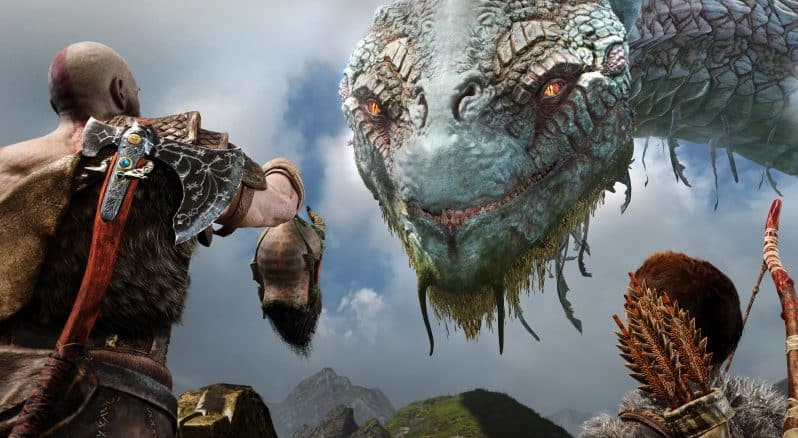
It also doesn’t hurt that the game is insanely well detailed and gorgeous, even without a PS4 Pro to power it.
All of this glowing praise is not to say that God of War (2018) does not have issues worth mentioning, of course. As strong as it otherwise is, the combat gameplay probably features the majority of any such complaints.
Firstly, while the totally-not-at-all-based-off-Thor axe throwing combat is a fun mechanic, it’s let down by the game’s honestly terrible targeting system. Pressing the right analogue stick will lock you onto an enemy – so long as you’re already looking at it. And if that enemy moves too much? No more lock-on. If you want to target another enemy, you must change the camera manually and toggle the lock-on again.
It becomes such a mess to attempt doing so that you almost certainly will stop trying. Later in the game, when you receive the game’s second weapon, it becomes hard to bother coming back to the axe. The much more extensive range and the ability to button mash your way through your enemies without having to worry about where the hell they are will spoil you.
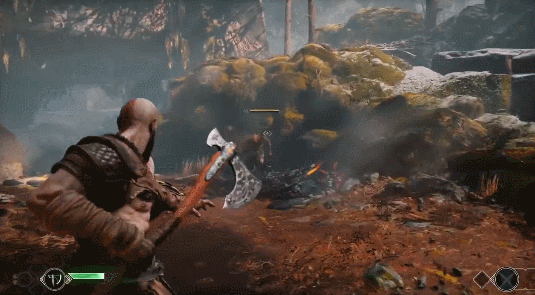
This dual weapon mechanic also introduces the game’s other identifiable combat weakness. Each weapon also has an elemental nature to its attacks, ice for the axe and fire for the later one. Some enemies can only be affected by one weapon, while some will take more significant damage from one of the elements. Bosses will eventually require you to switch between your weapons during the battle to use the right one for the given situation, and this is where the flaw in this mechanic comes in.
Switching between the weapons, particularly in combat, is just a pain. Changing to the axe at any point is made slightly easier by being able to press the ‘recall’ button, which will bring it to Kratos’ hand whether it’s chilling on his back or currently stuck in a demon’s face. The other weapon requires somewhat more dexterous input during combat to use the d-pad to switch to it. Meanwhile, also being careful to ensure that you don’t accidentally press the wrong button to disarm Kratos entirely and fight barehanded. An option afforded to you for specific combat situations but rarely is the choice you want.
Atreus joins the combat himself to slow down or annoy enemies while you deal with others. But, his primary use is to fire arrows at whatever enemy you’re currently fighting by pressing R2. Although, it takes some getting used to the idea even to remember to use Atreus’ arrows during combat.
Including Atreus in the combat is a solid mechanic, but it only really adds to a somewhat weighty pile of them. It takes long enough to master them that what you’ll end up hoping for most of all is that any of these newfound multi-tasking abilities will be directly applicable to the sequel so you can make the best use of them there.
One final criticism comes against the enemies you’ll fight throughout the game. Most of the various demons, witches, floaty tentacle monster things, etc., are just not that interesting as enemies. They come at you as nothing more than colourful canon fodder to mow through and rarely seem to have any thematic tie to the settings in the game nor the game’s overall themes.
They are an entirely functional piece of the game’s design and nothing more. The game’s mini-boss trolls exemplify this most of all. While each one is given a name to go with its health bar, they’re all ultimately the same enemy. The only troll that even puts up a remotely different style of fight is Hel’s Keeper. But, the fact that it is another troll, all the same, is a truly disappointing part of what should otherwise be a significant moment in the game.
Unfortunately, it’s tough to say much better of the Gods you fight within the game. Without giving too much away, it’s worth knowing that this game is very much set up as the first game in a series and as such, your interaction with this mythology’s Pantheon is somewhat limited.
There are, of course, fewer Norse Gods than Greek Gods to brutally murder, so with future games in mind, it’s not that surprising. Just don’t expect to be going up against Odin just yet. And don’t expect too much out of the Aesir you do get to fight either. These boss battles are genuinely unique fights throughout the game but often aren’t that much fun to hammer through.
Harder game modes than I was willing to try out would also likely end up seeing these points as serious hurdles to overcome to continue the game. Unfortunately, most of it comes from having to endure their length more than anything else. Gods rightly shouldn’t be so simple to kill, but each phase tends to linger just a little too long to be genuinely comfortable.
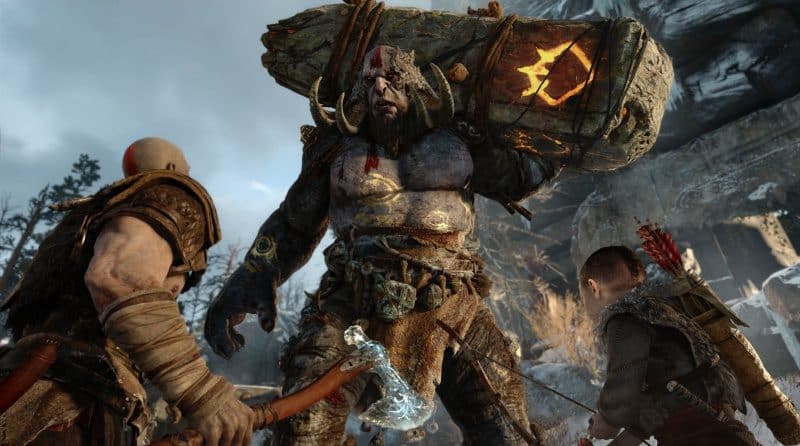
Flaws aside, though, what especially makes God of War such an unmissable game is the narrative and emotional heart of the game. The fact it’s such a robust action game on top is solely what justifies the use of the IP.
Somehow it manages the somewhat impossible task of making you give even the slightest bit of a shit about Kratos as a character. Even for fans of the original God of War series, it was hard to find anything endearing or relatable in the Ghost of Sparta as he murdered and fucked his way through Grecian legend. His backstory ultimately exists only as justification for his slaughter.
This time around, his backstory is that slaughter. He now needs to not only be better than that for his son’s sake but ensure that his son is better than that for everyone’s sake. Regardless of whether Atreus’ character ends up endearing to you by the end of the game (though it’d take a pretty firm heart to avoid it), it’s impossible to not find Kratos’ struggles as a father even more compelling than whether or not he’ll be able to punch this latest God to death.
It’s worth giving Christopher Judge – best known for playing Teal’C on Stargate and now Kratos in this game – an honourable mention as a significant component in what gives Kratos such depth. Not only in voice, but in his motion-capture acting of the character. Small moments, like Kratos’ initial hesitance to physically embrace his child, are what sells the character’s struggle to take on this role as a father and why you inevitably end up rooting for him and Atreus to make it work.
The ability to tell this game’s story in such a way that only adds to the overall gameplay is what makes God of War (2018) such a must-play title. Anyone who considers themselves a ‘gamer’ is in the hobby for precisely this kind of game. It takes Hollywood on at their game and demonstrates why games deserve to stand on their own as valuable entertainment culture.
There have been other games that do much the same, of course. Whether it’s small, focused indie titles or AAA blockbusters such as Red Dead Redemption or Grand Theft Auto. Games like Assassin’s Creed, Tomb Raider and Uncharted, all push forward with what such a single-player, narrative-led AAA game can do. To step up and use a game to tell a story, not to just use a story to make a game complete.
God of War (2018) will not be the last such game to weave such a well-crafted tale through a solid frame of robust gameplay. Spider-Man (2018) and Red Dead Redemption 2 (finally 2018) will almost certainly do the same and rightly challenge it for what will likely be a highly contested trophy as ‘Game of the Year’.
But, either way, it still takes its place amongst its own kind of Pantheon – a rare type of game that has a meaning beyond the confines of the action itself. Like that moment at the end of Red Dead Redemption, this game defines itself by the decisions the story takes, and that’s what we’ll always carry with us for having played the game.
To miss out on having that be a part of yourself is to miss out on what will surely be one of gaming’s cultural touchstones. If you already didn’t know what I was referring to when it comes to Red Dead Redemption, take that as an even greater reason to not miss out on what God of War offers you.
The Review
God of War (2018)
A top-down reinvention of Kratos turns the series' competent action gameplay into a thrilling and at times heart-breaking, cinematic adventure. An absolute must-play for anyone who loves gaming.
PROS
- Amazing story and cast
- Thrilling settings with plenty of variety
- Satisfying combat gameplay
CONS
- Too many identical bosses
- Boss fights become a war of attrition, long overstaying their welcome
- Combat strategy mostly comes down to navigating awkward controls to switch weapons
Review Breakdown
-
Graphics
-
Gameplay
-
Audio
-
Value for money






